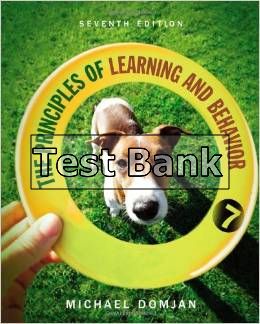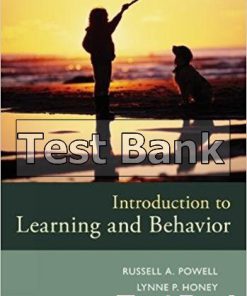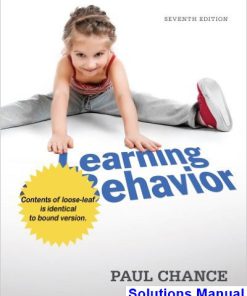Principles of Learning and Behavior 7th Edition Domjan Test Bank
$26.50$50.00 (-47%)
Principles of Learning and Behavior 7th Edition Domjan Test Bank.
You may also like
-
$26.50
$50.00
This is completed downloadable of Principles of Learning and Behavior 7th Edition Domjan Test Bank

Product Details:
- ISBN-10 : 1285088565
- ISBN-13 : 978-1285088563
- Author: Michael Domjan
From habituation, classical conditioning, and instrumental conditioning to stimulus control, aversive control, and their applications to the study of cognition, this learning and behavior textbook provides a comprehensive introduction to the elementary forms of learning that have been the focus of research for much of the 20th century. Applications boxes help you understand how findings from animal research relate to human learning and behavior, while neuroscience boxes offer you insights into the brain activity underlying learning.
Table of Content:
- Ch 1: Background and Rationale for the Study of Learning and Behavior
- Historical Antecedents
- The Dawn of the Modern Era
- The Definition of Learning
- Methodological Aspects of the Study of Learning
- Use of Nonhuman Animals in Research on Learning
- Sample Questions
- Key Terms
- Ch 2: Elicited Behavior, Habituation, and Sensitization
- The Nature of Elicited Behavior
- Effects of Repeated Stimulation
- The Dual-Process Theory of Habituation and Sensitization
- Habituation and Sensitization of Emotions and Motivated Behavior
- Concluding Comments
- Sample Questions
- Key Terms
- Ch 3: Classical Conditioning: Foundations
- The Early Years of Classical Conditioning
- Experimental Situations
- Excitatory Pavlovian Conditioning Methods
- Inhibitory Pavlovian Conditioning
- Prevalence of Classical Conditioning
- Concluding Comments
- Sample Questions
- Key Terms
- Ch 4: Classical Conditioning: Mechanisms
- What Makes Effective Conditioned and Unconditioned Stimuli?
- What Determines the Nature of the Conditioned Response?
- How Do Conditioned and Unconditioned Stimuli Become Associated?
- Concluding Comments
- Sample Questions
- Key Terms
- Ch 5: Instrumental Conditioning: Foundations
- Early Investigations of Instrumental Conditioning
- Modern Approaches to the Study of Instrumental Conditioning
- Instrumental Conditioning Procedures
- Fundamental Elements of Instrumental Conditioning
- Sample Questions
- Key Terms
- Ch 6: Schedules of Reinforcement and Choice Behavior
- Simple Schedules of Intermittent Reinforcement
- Choice Behavior: Concurrent Schedules
- Complex Choice and Self-Control
- Concluding Comments
- Sample Questions
- Key Terms
- Ch 7: Instrumental Conditioning: Motivational Mechanisms
- The Associative Structure of Instrumental Conditioning
- Response Allocation and Behavioral Economics
- Concluding Comments
- Sample Questions
- Key Terms
- Ch 8: Stimulus Control of Behavior
- Identification and Measurement of Stimulus Control
- Stimulus and Reinforcement Variables
- Learning Factors in Stimulus Control
- Contextual Cues and Conditional Relations
- Concluding Comments
- Sample Questions
- Key Terms
- Ch 9: Extinction of Conditioned Behavior
- Effects of Extinction Procedures
- Forms of Recovery from Extinction
- Enhancing Extinction
- What is Learned in Extinction?
- Paradoxical Reward Effects
- Resistance to Change and Behavioral Momentum
- Concluding Comments
- Sample Questions
- Key Terms
- Ch 10: Aversive Control: Avoidance and Punishment
- Avoidance Behavior
- Punishment
- Sample Questions
- Key Terms
- Ch 11: Comparative Cognition I: Memory Mechanisms
- Comparative Cognition, Consciousness, and Anthropomorphism
- Memory: Basic Concepts
- Working and Reference Memory
- Memory Mechanisms
- Forgetting and Sources of Memory Failure
- Consolidation, Reconsolidation, and Memory Updating
- Concluding Comments
- Sample Questions
- Key Terms
- Ch 12: Comparative Cognition II: Special Topics
- Food Caching and Recovery
- Timing
- Serial Order Learning
- Categorization and Concept Learning
- Tool Use in Nonhuman Animals
- Language Learning in Nonhuman Animals
- Sample Questions
- Key Terms
- References
- Name Index
- Subject Index
People Also Search:
principles of learning and behavior
principles of learning and behavior 7th edition domjan
principles of learning and behavior 7th edition
principles of learning and behavior 7th edition download scribd
principles of learning and behavior 7th edition testbank download pdf












